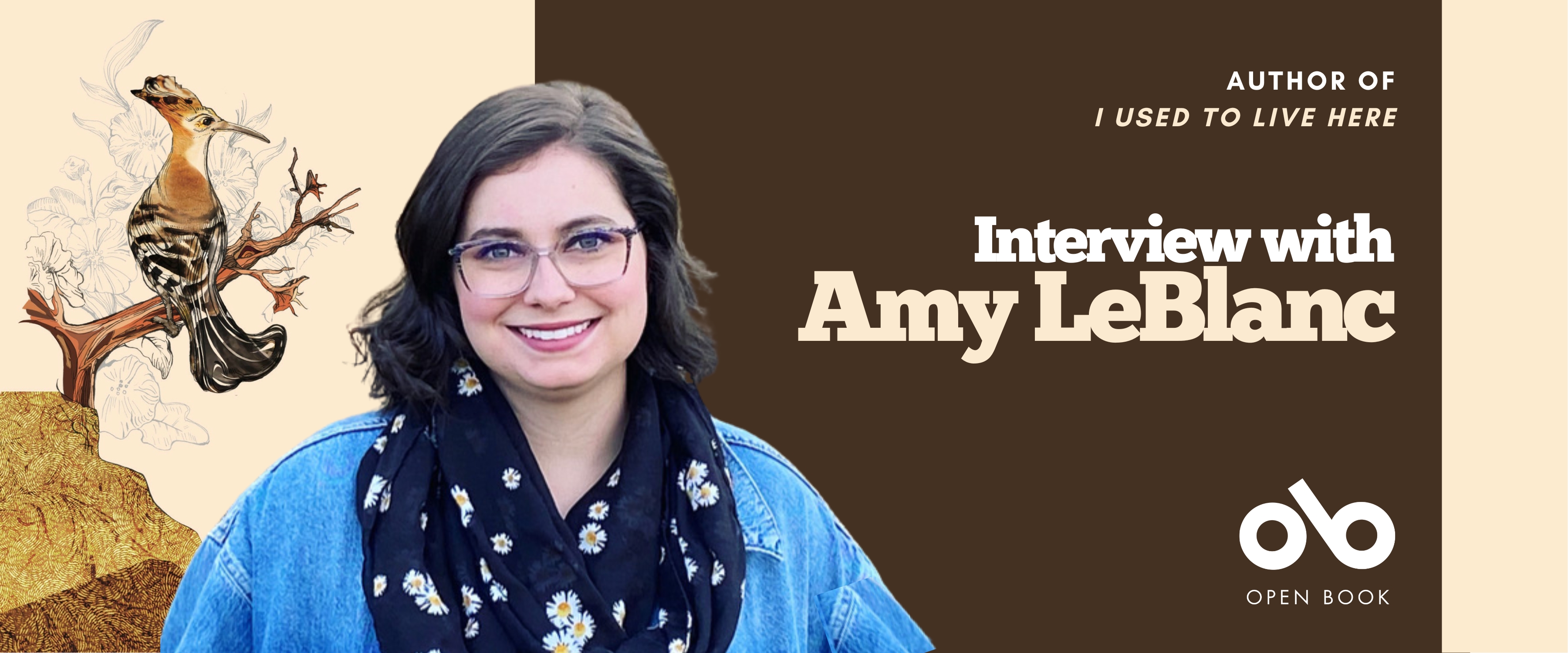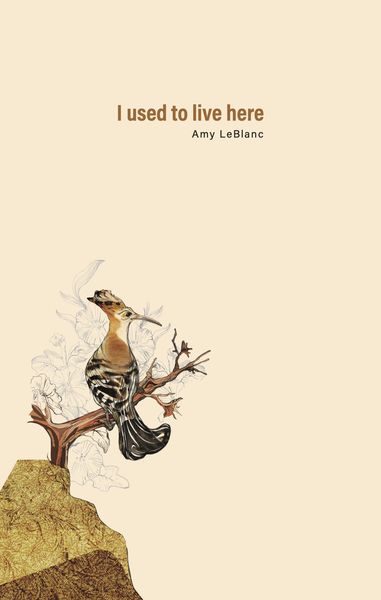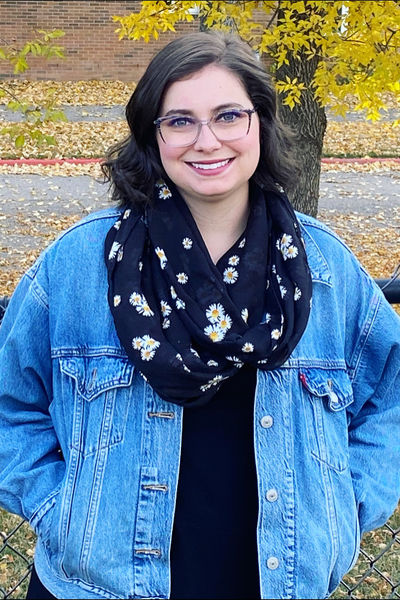Amy LeBlanc Explores What Happens When a Body No Longer Feels Like a Home in Her New Poetry Collection
There are many works of art about illness and disability, but the language and metaphors used to explore such conditions can often be infused with negative, even violent terms that do not truly represent the feelings of those who live these experiences.
Prolific and renowned poet Amy LeBlanc has taken the topic on in a unique and poignant way with a deep poetic meditation about autoimmunity and how a body can self-destruct and change. The title of her new collection, I used to live here (Gordon Hill Press), speaks directly to the idea of a body as a home, and what happens when it no longer feels that way. These poems explore new ways to write about bodily doubt, and are full of empathy and heart.
Check out our Line & Lyric Interview with the creative force behind this exciting new collection, right here on Open Book!
Open Book:
Can you tell us a bit about how you chose your title? If it’s a title of one of the poems, how does that piece fit into the collection? If it’s not a poem title, how does it encapsulate the collection as a whole?
Amy LeBlanc:
I read a lot of horror and haunted house novels— a recent favourite was Experimental Film by Gemma Files, which has an epigraph from Michael Rowe. I return to this quote often: “The body is our first haunted house. We live in it. We haunt it. We are literally our own ghosts.” Comparing a haunted house to a body is not new in horror, but I was particularly curious about how this could manifest in poetic form. In my title, the word ‘here’ is meant to be two-fold, referring to both the home space and body space. “I used to live here” is the longest poem in my collection and it is about what it means to go back home only to find that we can’t. ‘Home’ has changed irreparably but so have we. It is also about reckoning with a body that might malfunction or behave in ways it didn’t used to. Throughout this poem and others, I am working with an overarching idea that the body is not necessarily a comfortable or reliable home and this is something that some of us know more intimately than others. I am trying to poke a hole in the logical fallacy of bodily certainty and find moments of magic and ritual in bodily doubt.
OB:
Was there any research involved in your writing process for these poems?
AB:
There were certain poems that required more research than others, but research has always been one of my favourite parts of writing. For example, Lizzie Borden is the speaker of one of my poems and I ended up reading a biography on Lizzie, the murders, her pet pigeons, and the trial. I needed to research to have a chance at getting a voice that would ring true. Other poems had fully fabricated speakers, but I still needed to research some of the logistics. I wrote “A moment of mourning suspended in air” after reading an article about a dead bird that was seemingly suspended in air in Surrey, British Columbia. The final poem became a narrative that moved away from the facts, but the article was the original inspiration. In my doctorate, I spend all day researching, writing, and reading both critically and creatively, so I love reading and writing poetry that has a basis in something historical or fact-based that I can dig into.
OB:
What were you reading while writing this collection?
AB:
While I was writing this collection, I read a lot of different poets. To name a few: Ada Limón, Alycia Pirmohamed, Anne Carson, Conyer Clayton, Eli Tareq El Bechelany-Lynch, Emily Dickinson, Jericho Brown, Leah Lakshmi Piepzna-Samarasinha, Louise Glück, Natalie Diaz, Ocean Vuong, Rasha Abdulhadi, Sylvia Plath, and Terese Estacion. I also find that reading prose can help me get out of a poetic slump and can remind me to give my poems a little more breathing space. Right now, I’m reading Monstrilio by Gerardo Sámano Córdova and it has such a fascinating combination of body horror, family saga, and poetic language. I’m part way through Mariana Enríquez’s latest short story collection A Sunny Place for Shady People and Lydia Davis’s latest short story collection Our Strangers.
Your CanLit News
Subscribe to Open Book’s newsletter to get local book events, literary content, writing tips, and more in your inbox
OB:
Is there’s an individual, specific speaker in any of these poems (whether yourself or a character)? Tell us a little about the perspective from which the poems are spoken.
AB:
There’s a poem in the collection called “A message for one hundred and sixty rooms” which is dedicated to Sarah Winchester— one of my favourite historical figures. Sarah is the speaker of this poem and she’s speaking directly to her deceased husband. In the world of the poem, she is haunted by ghosts, but not by the ones she’d most like to see. By 1881, Sarah Winchester had lost her child to marasmus and her husband to tuberculosis. Her husband, William Wirt Winchester, was the heir to the Winchester Repeating Arms Company. She inherited almost a quarter of a million dollars, which she used to purchase a farmhouse in San Francisco. After consulting a medium to find meaning in her misfortune, Sarah decided that she was being haunted and punished by the malevolent spirits of those killed by Winchester Rifles. She began construction on her mansion in 1884, continually adding rooms, staircases, floors, and mirrors, all with the intention of confusing the spirits that plagued her until her death in 1922. She’s an incredibly interesting figure because her motivations are divisive: some believe in the lore of malevolent ghosts and others think she was an amateur architect expressing herself through her home space. It’s possible that both are true, but what I find most interesting are the modifications she made for accessibility. Sarah had rheumatoid arthritis and some of her home modifications, like her famous switchback stairs, were intended to decrease her chronic pain.
OB:
What advice would you give to an emerging or aspiring poet?
AB:
The biggest advice I have for emerging or aspiring poets is to read everything you can get your hands on and to get involved in community (whatever this looks like). Some of the most valuable lessons I’ve learned in poetry have come from community spaces in Alberta. I’ve had the opportunity to work with poets who are far more experienced than I and I’ve also had the opportunity to mentor emerging poets. I’ve gained so much from both mentoring and being mentored. I would also suggest that emerging and aspiring poets don’t worry too much about finding a distinctive poetic voice— this is something that emerges (and re-emerges) naturally.
______________________________________
Amy LeBlanc is a PhD student in English and creative writing at the University of Calgary. Amy's debut poetry collection, I know something you don’t know, was published with Gordon Hill Press in March 2020 and was long listed for the ReLit Award and selected as a finalist for the Stephan G. Stephansson Award for Poetry. Her novella, Unlocking, was published by the University of Calgary Press in June 2021 and was a finalist for the Trade Fiction Book of the Year through the Book Publishers Association of Alberta. Amy’s first short story collection Homebodies was published in spring 2023 with Great Plains Publications in their Enfield & Wizenty imprint, and her second full-length poetry collection, I used to live here, is forthcoming with Gordon Hill Press in spring 2025. Amy’s work has appeared or is forthcoming in Room, Arc, Canadian Literature, and the Literary Review of Canada among others. She is the author of three chapbooks of poetry—most recently, Undead Juliet at the Museum, which was published with ZED Press in August 2021. Amy is a recipient of the 2020 Lieutenant Governor of Alberta Emerging Artist Award and a CGS-D Award for her doctoral research into fictional representations of chronic illness and gothic spaces. She is a 2022 Killam Laureate.






